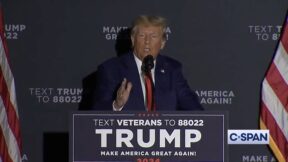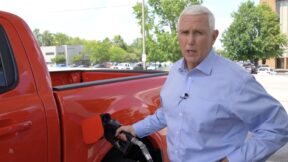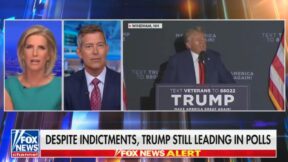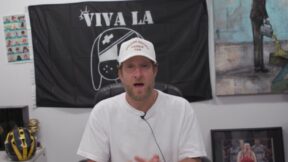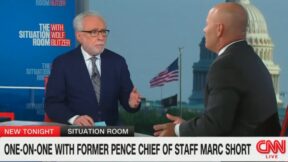Glenn Greenwald Makes Case Against Lying in Fawning Interview With Alex Jones
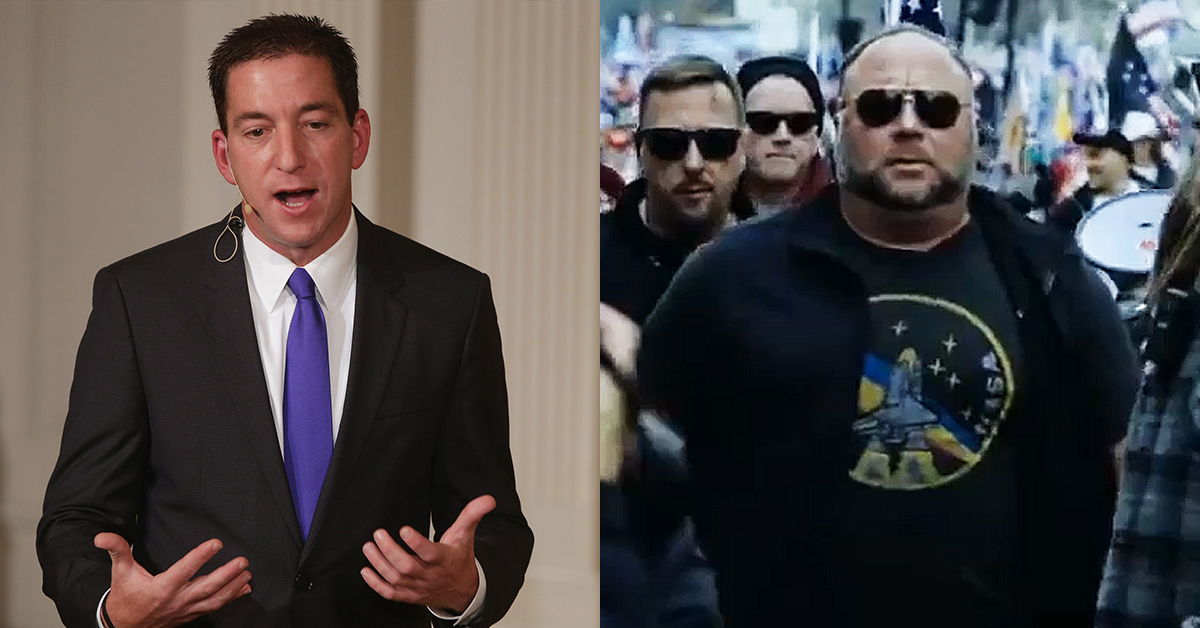
L: Chip Somodevilla, Getty Images; R: Image via Screenshot
When Glenn Greenwald announced that he would be hosting the premiere of a documentary on Alex Jones — and interviewing the infamous conspiracy theorist — many of those who once respected the famed investigative journalist lamented this new low in his career.
Greenwald fought back in a series of tweets skewering the “fucking stupid” notion that journalists should refrain from interviewing bad people, pointing out that mainstream media reporters have no compunction about interviewing George W. Bush and his ilk.
Fair point.
And yet Greenwald’s interview with Jones, who is currently on trial (there are three trials, actually) for repeatedly lying that the child victims of the Sandy Hook shooting were actors in a false flag operation, was not the kind of exchange you would expect between a journalist and an infamous purveyor of lies and conspiracy theories.
Greenwald kicked off the interview by asking Jones about being “disturbingly handsome” with a “natural charisma” when he started out his media career. He praised the InfoWars host for questioning the Iraq War and “spreading huge amounts of skepticism and doubt about the CIA, the U.S. security state.”
But when Greenwald did finally delve into what Jones is famous for — the rampant conspiracy theories — he repeatedly described those lies as “mistakes.”
It’s not a lenience Greenwald affords to the main target of the interview, the mainstream media, which he repeatedly pummeled for various sins, from the Russia investigation to Iraq.
A telling part of the conversation came when Greenwald asked Jones about the Jan. 6 riot at the U.S. Capitol. A riot Jones helped fuel with rants about a grand conspiracy to subvert the election and steal the presidency from Donald Trump.
“Looking back on what happened with January 6th, and the fact that most people there did heed those warnings to be nonviolent, but a few people didn’t, and they were able to take that and kind of spin this insurrection narrative out of it, that to this very day is the thing they’re trying to have shape the legacy of the Trump movement and Donald Trump himself,” Greenwald said.
“Do you look back on January 6th as something that was a huge strategic error with regret?” he asked. “Or do you think that it’s basically been a media distortion that has taken what was otherwise a good event and turned it into something darker?”
Greenwald paints a mightily generous picture of Jones’s actions on Jan. 6. While the InfoWars host did indeed encourage nonviolent protest, he raged at a rally the night before the riot that “globalists” were trying to steal the election.
“I don’t know how this is going to end, but if they want a fight, they’d better believe they’ve got one!” he said. The next day, he said on InfoWars: “This is the most important call to action on domestic soil since Paul Revere and his ride in 1776.”
He then marched on the Capitol with a bullhorn, chanting “stop the steal” to the raucous crowd.
When Greenwald asked about Jan. 6, Jones claimed the riot was fueled by undercover police seeking to spark a violent event so they could implement martial law.
“It was like a thousand feds and military who were in plainclothes,” he claimed. Jan. 6, Jones said, “was meant to provocateur us into a violent event that was meant to get out of control.”
Greenwald tried to steer toward the “underlying cause of January 6th,” which he correctly identified as Trump’s claim the 2020 election was stolen, by asking Jones whether he saw the stolen election conspiracy theory as similar to his false claims about Sandy Hook:
There is a point in the film where you were talking about Sandy Hook and I thought something you said was very poignant, which is anyone can kind of get carried away in their ideology where you start almost becoming so anti-establishment — I definitely feel this myself sometimes — that you kind of want to cast doubt on what the establishment is saying simply because they lie so often that you want to kind of make the point that these are untrustworthy institutions, independent of the argument you’re making.
Throughout the interview, Greenwald credited Jones for admitting he was wrong about Sandy Hook, which is another absurdly generous interpretation of what happened: Jones was sued by the tormented families of the victims and forced to retract and apologize for lying about their dead children.
Greenwald asked Jones if he conducted any sort of evidence-based investigation of the 2020 election, or if his claim it was stolen “was this kind of an ethos, like a way of saying that the establishment was so against Trump from the beginning in illegitimate ways that I’m going to kind of endorse this cause, not because it’s necessarily true in its particulars, but more as kind of a thematic way of protesting.”
So under Greenwald’s doctrine of media criticism, when mainstream media outlets mess up, they are guilty of vicious and unforgivable lies. When Alex Jones says children slaughtered in a school shooting are faking it, fueling years of threats against the victims’ families, or when his claims about a stolen election fuel a deadly riot at the U.S. Capitol, he is merely expressing “an ethos.”
It’s fine, for Greenwald, that Jones’s claims are not “necessarily true” in their particulars, because they are a “thematic way of protesting” against the establishment. In other words, his lies, or mistakes, are noble, because they advance the cause of contrarianism.
David French wrote recently about this rise of brainless contrarianism on the right with which Greenwald has formed a strange new alliance.
Unlike critical thinkers, who are universally skeptical, French wrote that the “contrarian commits a double error — he’s both excessively cynical and excessively credulous. He’s too quick to disbelieve one side and too quick to believe the opposite.”
“The same people who were catastrophically wrong about the severity of COVID or the effectiveness of vaccines continue to enjoy an audience from the same people who demand rigorous and merciless accountability from their political opponents,” French wrote.
That last argument has come, unfortunately, to define Greenwald’s body of media criticism. He is merciless in demanding accountability for cable news hosts like Nicolle Wallace or Rachel Maddow, but blind to the demagoguery and relentless dishonesty of Tucker Carlson.
Damon Linker made a similar case to French regarding what he calls Greenwald’s “selective skepticism.”
Over the years, Linker argued, Greenwald has developed a healthy distrust of government and the complicit media. But that skepticism has become selective. While he holds the mainstream media to a high standard of truth and accountability, Jones is treated with excessive credulity.
“Again and again, Greenwald applies intense skepticism to a finite list of political and journalistic enemies while applying none at all to those with whom he shares antipathies,” Linker wrote. “The enemies of his enemies are his friends, and friends apparently get an automatic pass.”
Jones is not, of course, the heroic truth-teller Greenwald wants him to be.
Despite setting up the InfoWars host to admit that like his Sandy Hook lies, his stolen election crusade was also untrue, Jones told Greenwald the election was indeed stolen — and proceeded to provide a series of debunked claims in support of that lie.
“I’ll be honest, which is what the establishment doesn’t do,” Jones said. “It was a yeah, no, it was a pre-baked deal that obviously Biden’s not going to get more votes than Trump.”
“Look at Biden, I mean, the guy can’t tie shoelaces, he didn’t win the election,” he said.
Jones cited Dinesh D’Souza’s comically bad election movie as proof.
“Now in hindsight with 2000 Mules, all this stuff that’s come out, I mean, I think that obviously, I don’t think Biden got more votes than Trump,” he said.
Greenwald, who spent most of the interview condemning the media as dishonest, said nothing in response to this blatant lie.
Linker has some worthy advice that media critics like Greenwald would be wise to follow:
By all means, be skeptical of supposedly established facts, reigning narratives of heroes and villains, and much else that’s said and done in Washington and the media. But don’t respond by dropping your guard against hucksters and charlatans on your own side, or any side—even, and perhaps especially, if they share your prejudices about who’s least trustworthy of all.
Jones is so obviously a charlatan that it makes you wonder if Greenwald is beyond salvation. When he did ultimately ask Jones to offer an explanation for the “mistakes” in his coverage, like Sandy Hook, Jones admitted that when it comes to the truth, he’s not particularly rigorous.
“Being on air four or five times a day, you’re very cavalier,” he said.
“You’re drinking vodka, and smoking cigarettes, and doing whatever,” Jones explained. “And you’re like, ‘Oh yeah it’s a bunch of fake BS man!’ And you’re sued for it. Oh God.”
This is an opinion piece. The views expressed in this article are those of just the author.
